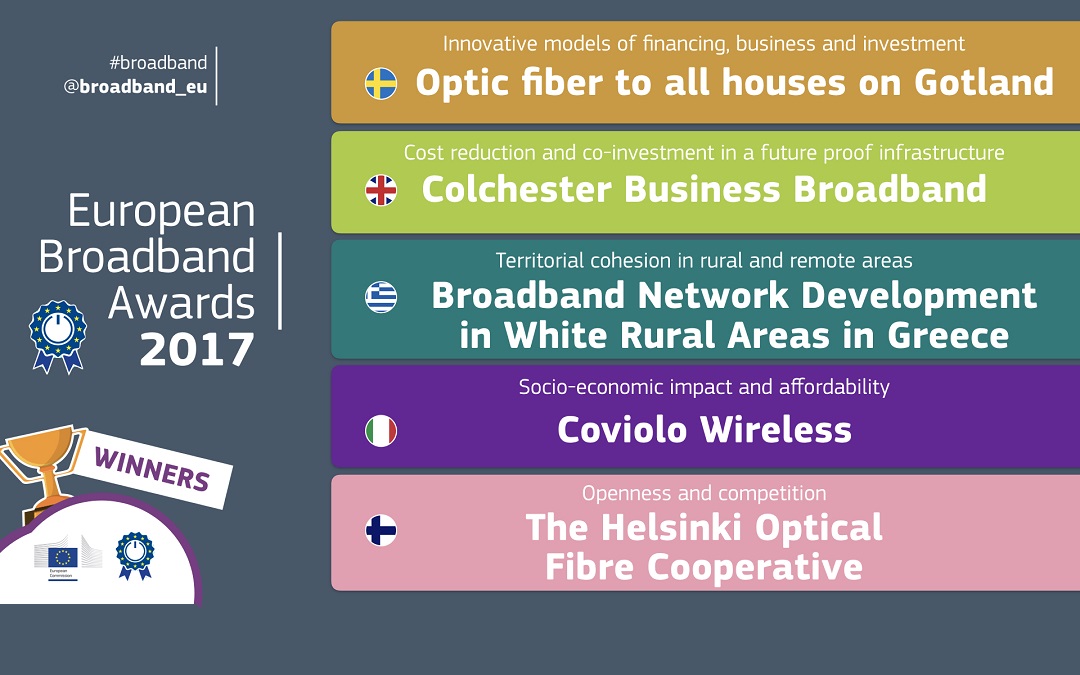The European Commissioner for Regional Policy Corina Crețu and Commissioner for Agriculture & Rural Development, Phil Hogan awarded the five winners of the European Broadband Awards 2017 at the Award Ceremony in Brussels on 20 November. For each of the five categories one project was awarded.
Overall 49 projects from 20 EU countries applied for the European Broadband Awards 2017. Five European experts in broadband assessed the projects and selected the best five projects from the 15 finalists. The awarded projects are to be seen as exemplary for other European regions and organisations planning broadband rollout.
Category 1: Innovative models of financing, business and investment
Winner: Optic fiber to all houses on Gotland, Sweden
This project brought fiber to the whole Gotland island in the Baltic sea. The results show that at least 85% of residents and 50% of people owning summer houses there have joined the project. The public administrations have spent EUR 4.3 million, of which EUR 2 million came from the EU funds. The people of Gotland payed some EUR 12 million. To keep the costs low, people offered their land for cable rollout and even dig them themselves. 57 thousand people now have fiber in Gotland.
Category 2: Cost reduction and co-investment in a future proof infrastructure
Winner: Colchester Business Broadband, UK
Colchester’s open access passive fibre network delivers up-to-gigabit connectivity to more than 850 SMEs and 1.100 households in a previously underserved area of Colchester in the newly constructed buildings. The project was financed by three sources: EUR 225.913 from the South Eastern Local Enterprise Partnership; EUR 161.528 from the Essex County Council and EUR 45.182 from the construction companies.
Category 3: Territorial cohesion in rural and remote areas
Winner: Broadband Network Development in White Rural Areas of Greece
This large scale EU funded project, helped deploying broadband in rural areas in Greece previously not connected online. It provided connectivity to more than half a million people in white areas in Greece. The total cost of the project is EUR 199.7 million of which EUR 143.8 million came from EU structural funds. The project aimed at closing the “broadband gap” between remote, disadvantageous, traditionally “white rural areas” and the rest of the country, providing good connectivity services at affordable costs. A mix of technologies was used: fibre and wireless backhauling, wireless and VDSL access.
Category 4: Socio-economic impact and affordability
Winner: Coviolo Wireless, Italy
The project has been implemented by a group of citizens affiliated to the Neighbourhood Social Center of Coviolo, in collaboration with the Municipality of Reggio Emilia and Lepida Spa. A white spot area was covered with broadband. The cost of the project: EUR 33.582 (EUR 10.000 from the Municipality of Reggio Emilia, EUR 14.582 from the Neighbourhood Social Centre -NSC- of Coviolo and EUR 9.000 from the Lepida spa). Users of broadband in the region are co-financers and have now high speed internet access that can be expanded to 1.000 Mbps without any structural intervention at an affordable cost.
Category 5: Openness and competition
Winner: Helsinki Optical Fibre Cooperative, Finland
Marttila is a small village-like neighbourhood in the Helsinki metropolitan area where war veterans and disabled people built their modest homes (on city owned land) in the late 1940s. As the building density is low, private telecom operators were not interested in bringing fibre technology. Therefore, the residents established a cooperative to build their own high-capacity network. The cooperative members financed the project themselves with EUR 170.000. There was no other private or public funding. All planning and much of the physical work has been done by cooperative members themselves who continue to own and manage the network. The project resulted in 96% coverage and 70% penetration.South Eastern Local Enterprise Partnership
The European Broadband Awards are open to all types of projects irrespective of the size, location, or technologies used. The competition targets national, regional, and local public authorities (e. g. municipalities, regions and administrations) as well as large and small privately funded projects that adopt innovative models of investment, business or financing structure, such as financial instruments.
The European Broadband Awards 2017 have been organized by aconium GmbH as part of the Broadband Europe project. In this context, aconium was responsible for conception, implementation, pre-scoring or applications as well as for coordination between DG Connect, jury and applicants.
More information about the Awards are available at the European Broadband Awards page.
Video of the award ceremony
Picture: Winners of European Broadband Awards 2017.
Credit: European Commission, GD Connect.

